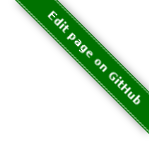<Component Thruk::Plugin::NodeControl> # command will be run on the local node (the one starting the update) prior the update. Exit code != 0 will abort the update #hook_update_pre_local = # command will be run on the remote node (the one which will be updated) prior the update. Exit code != 0 will abort the update # use special syntax with script: prefix to upload local script, ex.: script:local/script.sh #hook_update_pre = if [ $(git status --porcelain 2>&1 | wc -l) -gt 0 ]; then echo "omd home not clean"; git status --porcelain 2>&1; exit 1; fi # command will be run on the remote node (the one which will be updated) after the update #hook_update_post = git add . && git commit -a -m "update to omd $(omd version -b)" # command will be run on the local node (the one starting the update) after the update. #hook_update_post_local = # set to 0 to disable ssh fallback in case http connection fails #ssh_fallback = 1 # ssh base options in case of ssh fallback connection ssh_base_options = -o BatchMode=yes -o LogLevel=INFO -n -T # ssh additional options ssh_options = # ssh base options in case of ssh fallback connection scp_base_options = -B # ssh base options in case of ssh fallback connection scp_options = # set to 0 to disable os updates, set it to 2 to show updates but dont offer updating them #os_updates = 1 # set to 0 to disable pkg installation #pkg_install = 1 # set to 0 to disable pkg update #pkg_update = 1 # set to 0 to disable pkg cleanup #pkg_cleanup = 1 # set to 0 to hide 'all' buttons #all_button = 1 # number of parallel task when running actions for all hosts #parallel_tasks = 3 # set to 1 to not require confirm on all actions #skip_confirms = 0 # exclude sites (by name or id) from node-control (comma separated regular expressions) #excludes = site1,site2 # command used to cleanup unused omd versions #cmd_omd_cleanup = sudo -n omd cleanup # script used to do the omd update #omd_update_script = scripts/omd_update.sh cmd_yum_pkg_install = sudo -n yum install -y %PKG cmd_dnf_pkg_install = sudo -n dnf install -y %PKG cmd_apt_pkg_install = DEBIAN_FRONTEND=noninteractive sudo -En apt-get install -y %PKG cmd_yum_os_update = sudo -n yum upgrade -y cmd_dnf_os_update = sudo -n dnf upgrade -y cmd_apt_os_update = DEBIAN_FRONTEND=noninteractive sudo -En apt-get upgrade -y cmd_yum_os_sec_update = sudo -n yum upgrade -y --security cmd_dnf_os_sec_update = sudo -n dnf upgrade -y --security cmd_apt_os_sec_update = DEBIAN_FRONTEND=noninteractive sudo -En apt-get upgrade -y </Component>
Node Control Thruk Plugin
This plugin allows you to control nodes (OMD / OS) from within Thruk.

Features
-
OMD installation
-
OMD site updates
-
OMD cleanup old unused versions
-
OMD services start/stop
-
OS Updates
Installation
This plugin requires OMD (omd.consol.de).
This is a core plugin, so it is shipped with Thruk and can simply
be enabled by running: thruk plugins enable node-control or
from the plugins section in the config tool.
It worked if you have a new menu item under System → Node Control.
Setup
The controlled sites need to have (optional) sudo permissions for omd and their package manager.
-
Debian:
siteuser ALL=(ALL) NOPASSWD: /usr/bin/omd, NOPASSWD:SETENV: /usr/bin/apt-get -
Centos:
siteuser ALL=(ALL) NOPASSWD: /usr/bin/omd, NOPASSWD: /usr/bin/dnf
(replace siteuser with the actual site user name)
Optional ssh login helps starting services if http connection does not work, for ex. because the site is stopped.
Without sudo permissions you can only update to existing omd versions.
Configuration
thruk_local.conf:
Configure hooks to automatically checkin the version update into git. Requires git and the omd site in a git repository.
Hooks
Hooks will be run in this order:
-
hook_update_pre_local: command will be run on the local node prior the update. -
hook_update_pre: command will be run on the remote node prior the update. -
hook_update_post: command will be run on the remote node after the update. -
hook_update_post_local: command will be run on the local node after the update.
The pre hooks can abort the update process by exiting != 0.
All hooks can make use of the following environment variables:
-
PEER_NAME: name of the backend as set in the thruk.conf. -
PEER_KEY: internal id of the backend. -
OMD_HOST_NAME: remote host name of this backend. -
SITE_NAME: site name which will be updated. -
FROM_OMD_VERSION: current omd version that site is running. -
OMD_UPDATE: omd version that’ll be used for the update.
If a hook prints [ERROR] or [WARNING] messages, the logfile will be
highlighted. This can be used to indicate non-fatal issues.
Additional Backends
It is possible to add additional backends to node-control, even if they should not be used as normal backends on the status pages.
Adding tags = node-control to the backend configuration hides the backend
on the normal status pages and only show them on the node control page.
For example if the backend is available by ssh only:
thruk_local.conf:
<Component Thruk::Backend>
<peer>
name = ssh only
type = configonly
tags = node-control
<options>
host_name = some_ssh_hostname.local
site_name = omd_site_user
</options>
</peer>
</Component>
And if it’s a OMD site available by http:
<Component Thruk::Backend>
<peer>
name = http backend
type = http
tags = node-control
<options>
peer = https://http_site.local/sitename/
auth = http auth key
</options>
</peer>
</Component>
